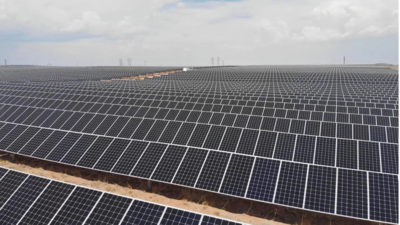ARTICLE AD BOX

BATHINDA: The Sixth meeting of the International Solar Alliance (ISA) Regional Committee for Europe and the others region was convened in Brussels under the chairmanship of Germany as the Regional Vice President, on Thursday.
The meeting brought together 20 countries from the region and partners to review progress, align strategic priorities, and advance collaborative action to further the ISA mission and strengthen ongoing engagements with countries in the region. ISA Director General Ashish Khanna stated that we face critical contradictions and concerns regarding solar energy. Data states that nearly $2 trillion was invested in clean energy in the last fiscal year alone, with solar photovoltaics leading the way and holding the largest share of these investments.
Despite this growth, the distribution remains unequal. Only 15% of these investments are reaching low- and middle-income countries, and less than 2% is going to Africa, a region with some of the world’s best solar radiation potential.
” Focusing on the issue of energy access, he said, “With 600 million people in Africa still living without access to electricity—and across the Global South, where 70% of the world’s population resides—there is an urgent need for nearly $200 billion in investments.
ISA is mobilising $200 million to leverage more than 30 times the private investment in distributed renewable energy in Africa while connecting 16 centres of excellence with digitalisation support from Global Capability Centres (GCC); providing technology and policy roadmaps while engaging in-depth across select countries.
” Tobias Rinke, Deputy Head of Division, Federal Ministry for Economic Affairs and Energy, Germany, as the chair of the meeting reaffirmed the collective commitment to advancing solar energy and ensuring its benefits are equitably distributed across the world.
He highlighted the International Solar Alliance’s evolution into a truly global platform, now comprising 123 member and signatory countries, and noted the doubling of active engagements since 2022.
He emphasised that the meeting presents a timely opportunity to shape the next phase of ISA’s global agenda. He further emphasised the global consensus reached at COP28 in Dubai, where countries agreed to triple renewable energy capacity, enhance energy efficiency by 2030, and transition away from fossil fuels.
He underscored the critical role of solar energy in achieving these goals—not only as a key solution in the fight against climate change, but also as a means to enhance energy security, reduce dependence on fossil fuel imports, drive economic growth, and create quality jobs. Highlighting the leadership potential of Europe and other regions, he pointed out that the region comprises some of the world’s most advanced economies, innovation leaders, and green technology pioneers. Ms Laura Cozzi, Director of Sustainability, Technology, and Outlooks at the International Energy Agency (IEA), addressed the rise of artificial intelligence in rapidly reshaping global energy systems. She noted that artificial intelligence is fundamentally transforming the energy sector, simultaneously driving up electricity demand—particularly through data centres—and offering innovative solutions for grid management and the integration of renewable energy.
She highlighted projections indicating that AI-related infrastructure could add electricity demand equivalent to that of a ‘new Japan’ by 2030.
Despite this surge, AI holds immense potential to optimise grid operations, accelerate solar deployment, and improve energy access, particularly in the Global South. ISA Director General engaged in a wide-ranging conversation with Ms Kate Hampton, CEO of the Children’s Investment Fund Foundation (CIFF), exploring the shifting role of philanthropy in climate finance.
Against the backdrop of declining aid flows and rising urgency for sustainable investment, the dialogue delved into catalytic finance, solar deployment, and the systemic reforms needed to unlock meaningful progress across the Global South.
Kate Hampton emphasised that accelerating solar deployment is essential for advancing both human development and climate goals, as it significantly contributes to productivity gains and emissions reductions.
She pointed out that the key financial barrier is not the availability of debt, but the lack of catalytic or patient equity—an instrument crucial for mobilising private investment. She highlighted the unique role of philanthropy in addressing this gap by supporting country platforms through technical assistance, policy engagement, and junior equity.
Additionally, she stressed that a major constraint lies in the availability of skilled professionals capable of navigating the complexities of delivery, policy, and finance—an area where philanthropic support can be instrumental in breaking bottlenecks and advancing projects. Dan Jørgensen, Commissioner for Energy and Housing at the European Commission, emphasised the urgency of Europe's response to rising energy costs and the escalating climate crisis. He highlighted solar energy as central to the solution, noting its role in reducing fossil fuel dependency, enhancing competitiveness, and lowering emissions. He pointed out that at the EU level, the cost of solar power has fallen by 82% over the past decade, with an additional 12% global decline in 2023 alone—making solar not only the fastest-growing but also the most affordable clean energy source.



.png)
.png)
.png)
















 12 hours ago
7
12 hours ago
7









 English (US) ·
English (US) ·